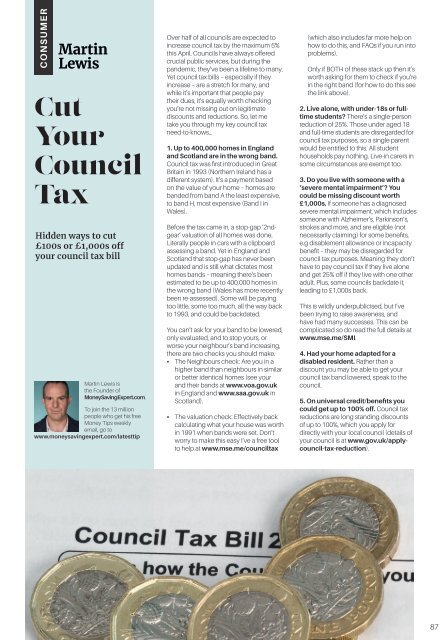Eastlife Spring 2021
This is our fourth issue during the pandemic. Fourth! I can’t quite believe it. Like many other businesses we have learned to adapt. I am no longer flustered when events are cancelled at the last moment before print, it has become the norm.
This is our fourth issue during the pandemic. Fourth! I can’t quite believe it. Like many other businesses we have learned to adapt. I am no longer flustered when events are cancelled at the last moment before print, it has become the norm.
Create successful ePaper yourself
Turn your PDF publications into a flip-book with our unique Google optimized e-Paper software.
CONSUMER<br />
Martin<br />
Lewis<br />
Cut<br />
Your<br />
Council<br />
Tax<br />
Hidden ways to cut<br />
£100s or £1,000s off<br />
your council tax bill<br />
Martin Lewis is<br />
the Founder of<br />
MoneySavingExpert.com.<br />
To join the 13 million<br />
people who get his free<br />
Money Tips weekly<br />
email, go to<br />
www.moneysavingexpert.com/latesttip<br />
Over half of all councils are expected to<br />
increase council tax by the maximum 5%<br />
this April. Councils have always offered<br />
crucial public services, but during the<br />
pandemic, they’ve been a lifeline to many.<br />
Yet council tax bills – especially if they<br />
increase – are a stretch for many, and<br />
while it’s important that people pay<br />
their dues, it’s equally worth checking<br />
you’re not missing out on legitimate<br />
discounts and reductions. So, let me<br />
take you through my key council tax<br />
need-to-knows…<br />
1. Up to 400,000 homes in England<br />
and Scotland are in the wrong band.<br />
Council tax was first introduced in Great<br />
Britain in 1993 (Northern Ireland has a<br />
different system). It’s a payment based<br />
on the value of your home – homes are<br />
banded from band A the least expensive,<br />
to band H, most expensive (Band I in<br />
Wales).<br />
Before the tax came in, a stop-gap ‘2ndgear’<br />
valuation of all homes was done.<br />
Literally people in cars with a clipboard<br />
assessing a band. Yet in England and<br />
Scotland that stop-gap has never been<br />
updated and is still what dictates most<br />
homes bands – meaning there’s been<br />
estimated to be up to 400,000 homes in<br />
the wrong band (Wales has more recently<br />
been re-assessed). Some will be paying<br />
too little, some too much, all the way back<br />
to 1993, and could be backdated.<br />
You can’t ask for your band to be lowered,<br />
only evaluated, and to stop yours, or<br />
worse your neighbour’s band increasing,<br />
there are two checks you should make.<br />
• The Neighbours check: Are you in a<br />
higher band than neighbours in similar<br />
or better identical homes (see your<br />
and their bands at www.voa.gov.uk<br />
in England and www.saa.gov.uk in<br />
Scotland).<br />
• The valuation check: Effectively back<br />
calculating what your house was worth<br />
in 1991 when bands were set. Don’t<br />
worry to make this easy I’ve a free tool<br />
to help at www.mse.me/counciltax<br />
(which also includes far more help on<br />
how to do this, and FAQs if you run into<br />
problems).<br />
Only if BOTH of these stack up then it’s<br />
worth asking for them to check if you’re<br />
in the right band (for how to do this see<br />
the link above).<br />
2. Live alone, with under-18s or fulltime<br />
students? There’s a single-person<br />
reduction of 25%. Those under aged 18<br />
and full-time students are disregarded for<br />
council tax purposes, so a single parent<br />
would be entitled to this. All student<br />
households pay nothing. Live-in carers in<br />
some circumstances are exempt too.<br />
3. Do you live with someone with a<br />
‘severe mental impairment’? You<br />
could be missing discount worth<br />
£1,000s. If someone has a diagnosed<br />
severe mental impairment, which includes<br />
someone with Alzheimer’s, Parkinson’s,<br />
strokes and more, and are eligible (not<br />
necessarily claiming) for some benefits,<br />
e.g disablement allowance or incapacity<br />
benefit – they may be disregarded for<br />
council tax purposes. Meaning they don’t<br />
have to pay council tax if they live alone<br />
and get 25% off if they live with one other<br />
adult. Plus, some councils backdate it,<br />
leading to £1,000s back.<br />
This is wildly underpublicised, but I’ve<br />
been trying to raise awareness, and<br />
have had many successes. This can be<br />
complicated so do read the full details at<br />
www.mse.me/SMI.<br />
4. Had your home adapted for a<br />
disabled resident. Rather than a<br />
discount you may be able to get your<br />
council tax band lowered, speak to the<br />
council.<br />
5. On universal credit/benefits you<br />
could get up to 100% off. Council tax<br />
reductions are long standing discounts<br />
of up to 100%, which you apply for<br />
directly with your local council (details of<br />
your council is at www.gov.uk/applycouncil-tax-reduction).<br />
87
















